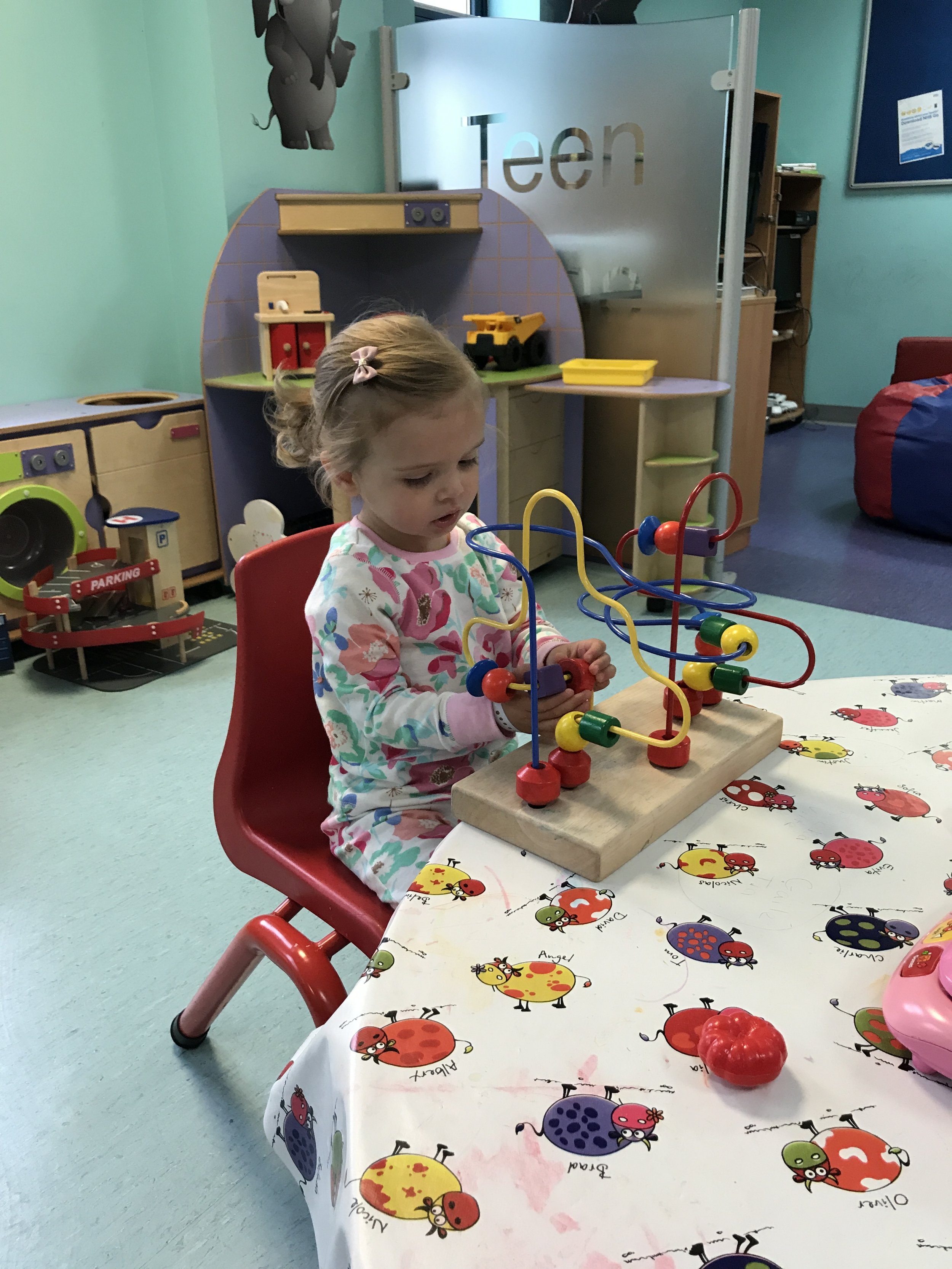My Child Has Type 1 Diabetes
/Today is World Diabetes Day so as my daughter was diagnosed (Two months ago to this date!) with Type 1 I thought maybe it was time to tell our story.
How it all began
In August this year we had just returned from holiday. My daughter who had turned two that month came down with a bad bout of tonsillitis. Antibiotics took forever to work and her temperatures were over 40. This is unusual for her as she's the 'well child' of the family and even if she has an ailment her temperature rarely goes up.
I noticed during this period her intake of drinks increased dramatically. Instead of one cup of milk she was requesting 2 or 3. Instead of one cup or water she would down this straight away and ask for another immediately. At first I thought maybe it was the after effects of being ill and a bit dehydrated. But as time went on I started to worry. She would cry in the night and when I went in, her bed was wet as her nappies were exploding with urine.
I googled extreme thirst and one of things that came up was diabetes. But I thought it couldn't be this surely. It must just be a virus. She had also lost some weight but as she was two and was now running around like crazy with her brother and losing her 'baby fat' on her thighs etc I thought this was normal.
So off we went the GP, I told her what had been going on, she used a blood finger prick test on her finger and we were sent to A&E with a letter.
I arrived and within ten minutes someone re-tested her finger. The nurse told me "Your daughter has Type 1 diabetes" I asked him are you sure? Don't you need to do a blood test? He said "We will, but a normal level of blood sugar is 4-7. Once you go over 11 you have diabetes. Your daughter is at 28 she will be staying in hospital".
I was then seen by a doctor, he explained it was true. She did have it. Luckily she was not yet in DKA (a life threatening consequence of undiagnosed diabetes). But he answered my questions. Yes she will have it her whole life. No it's not diet related. I was so worried that we eat a lot of pasta, had I caused it? No he told me. There is nothing you could have done, you haven't created this. But she will have it forever.
I know a lot of people describe being hit by a train but I think this is probably the most accurate description of how I felt at this moment. How would I break the news to my Husband. I knew I would be breaking his heart. She's only two and now she has a lifelong condition.
So what is Type 1 Diabetes?
Type 1 diabetes, once known as juvenile diabetes, (Even though it can strike at any age), is a chronic condition in which the pancreas produces little or no insulin. Insulin is a hormone needed to allow sugar (glucose) to enter cells to produce energy.
In this condition your own body is attacking and killing off the cells that make the insulin until there are none left or the cells just stop producing it. It's called an autoimmune condition.
A sweet nurse who had Type 1 herself described it to me as this:
Your body uses the nutrients in your food as energy. If you imagine that every part of the body has a door to it which is closed. When you eat your body produces insulin which unlocks these doors and lets the energy go to every part of your body. Your brain, heart, legs, arms everywhere.
In people who don't produce insulin anymore the doors remain shut and the energy can't get to the parts of your body it's needed in. This is bad for the areas where you need the energy and makes you tired and means that all these nutrients get flushed out of you in the form of urine. But also it means the energy or sugar just goes round and round your body increasing. Both having too high a blood sugar or too low is dangerous.
How do you get it?
People always say to me, I think almost to reassure themselves "Oh so it's in your family then?" But alas no. Diabetes type 1 or 2 isn't in our family. It can be hereditary but also many people have no connection to the condition at all.
Other common misconceptions are that you've fed your child sweets, or that you've caused it through diet. This is not the case.
Our doctors have told us that some people are more predisposed to getting it and that you need a trigger to make it appear. These triggers can be a viral illness such as tonsillitis. Some people get it after stomach bugs. Any viral illness can set it off. Some vaccines possibly have a link to it. It's virtually impossible at this stage for the medical community to know who gets it and why.
So what should you look out for?
Extreme thirst
Being very tired - more so than usual, my daughter had started to need longer naps
Needing to go for a wee more often
Unexplained weight loss
If in doubt go to your GP and request a blood sugar finger prick test. Doctors often don't do these as a lot of the symptoms are common of the average viral illness. But the test is extremely cheap to perform and can be done in the doctors surgery, they will have the test kit there in their office.
It's important to catch it as soon as you can to avoid the dreadful complications of your child slipping into DKA mentioned above.
How are we now?
We are two months in. It definitely takes a while to grieve (And we still are), to recover from the shock. For your child to understand that something has changed and it isn't going away.
My daughter has 4 injections of insulin a day. One in the morning which gives her a low level that works over 24 hours and then she has to have an extra injection before each meal. Some days I have to pin her down to do it. Some she's fine and doesn't notice it.
She has finger prick tests at least 5 times a day. On rising, before each meal, 2 hours after each meal and before bed. Then should we be worried about her level at night we re-test.
We have to make a note of how much carbohydrate she eats at every meal and adjust her insulin dose to match her carbs. We have become in a very short time, experts on our daughter's diabetes. That said we still aren't getting perfect levels as it's so hard to match the insulin. The sugars from pasta and bread will have a different affect than those from vegetables or meat.
The Bright Side
It will be hard to see a bright side at first. Within days of my daughter's diagnosis I googled 'Life expectancy' for someone with Type 1. It was one of the hardest things I've ever done. But I had to know what I was up against so I could almost know the worst and then pull myself together and try and act positive.
It turns out that life expectancy is not that different to the average person. For women it's 68 years and men 66 years. However if you manage your condition really well it can be much longer and comparable to a non-diabetic.
The way to improve life expectancy is to try to keep your levels to stay around the 4-7 mark for non-diabetics. If your levels are too high for too long throughout your life then it affects parts of your body. And this affects life expectancy.
Managing your levels consistently is difficult. However through the use of technology good levels have become much more achievable. Many people and especially children are now using insulin pumps. These have a small tube which attaches to your stomach area or back and releases insulin into your body slowly and then you can add extra units to it depending on what you're about to eat.
Continuous Glucose Monitors (CGMs) are another amazing invention whereby a little sensor attaches to your arm or thigh and monitors your blood glucose level constantly. It then alarms if it sees you going too low or high so you can quickly correct it.
Obviously every person will prefer a different option and some people don't like to be attached to something. However the can give you greater control of your levels.
What to do now
It's really important to surround yourself with positive people during this time. Some people will send you miracle cures that they think will fix you. (There currently is no cure. However it's possible there will be in around ten years time).
Join some Facebook Groups but avoid those where people are scaremongering. Leave any that make you worry more.
Read all that you can about diet and diabetes. It can be really useful and help you manage levels better.
Check out JDRF and Diabetes UK, diabetes.co.uk all provide good support networks.
Talk to people. Don't keep it a secret. The more you open up the more you will hear stories of hundreds of people already managing the condition and leading a normal life. You need to hear these stories!
Take the trip, go out for dinner, go to the park. Do everything you did before. You will have to be organised and take more snacks with you and kit but don't become a recluse because of what might happen. You learn every time you do something.
Lastly, read this post 'Diabetes Anniversary: Not Drowning But Waving' by Helen of Actually Mummy Blog. This article made my Husband and I cry but also gave us brilliant and much-needed perspective that we would all be ok.
Remember that your child is just as perfect as they always were and in that respect, nothing has changed!































